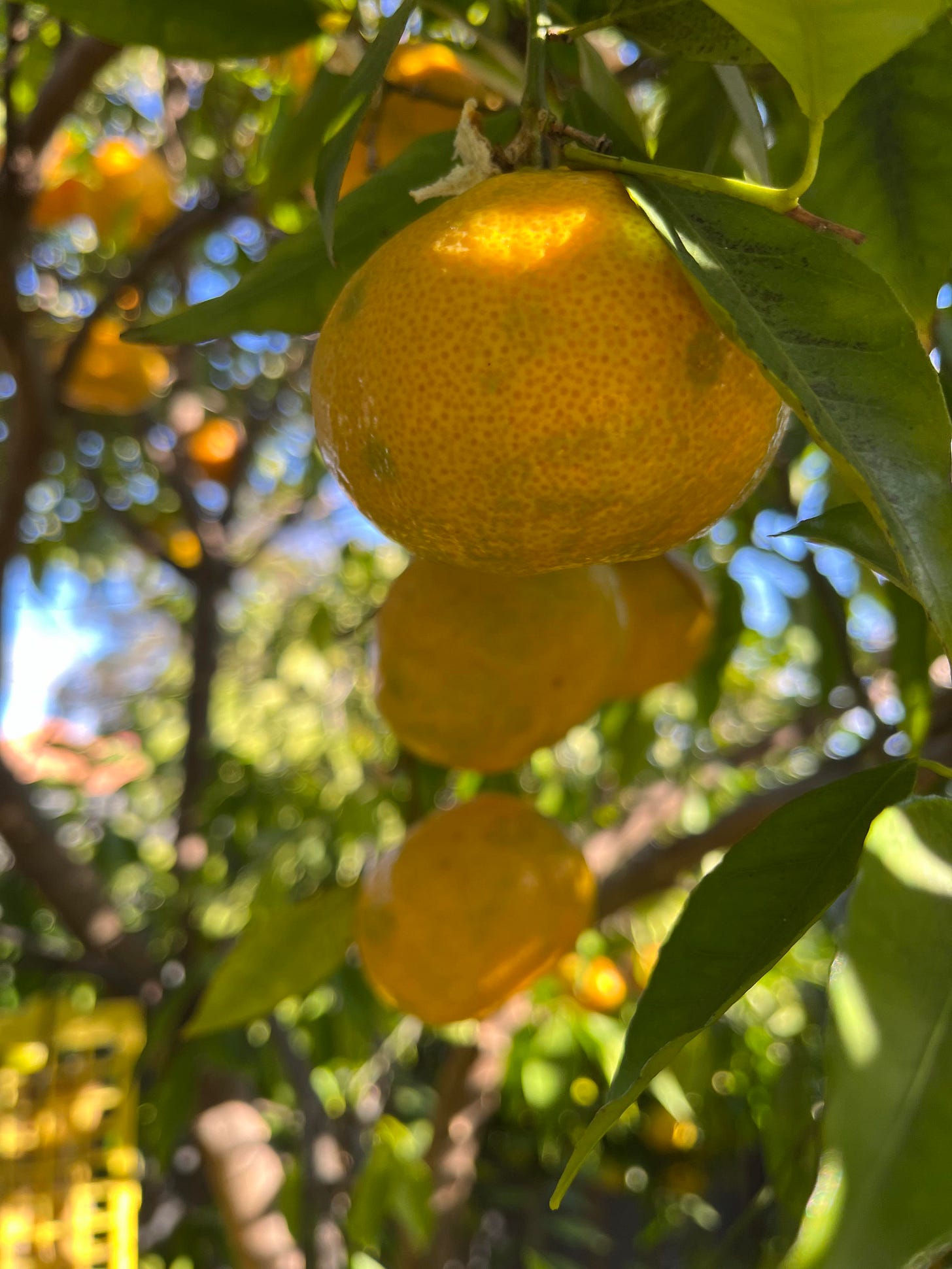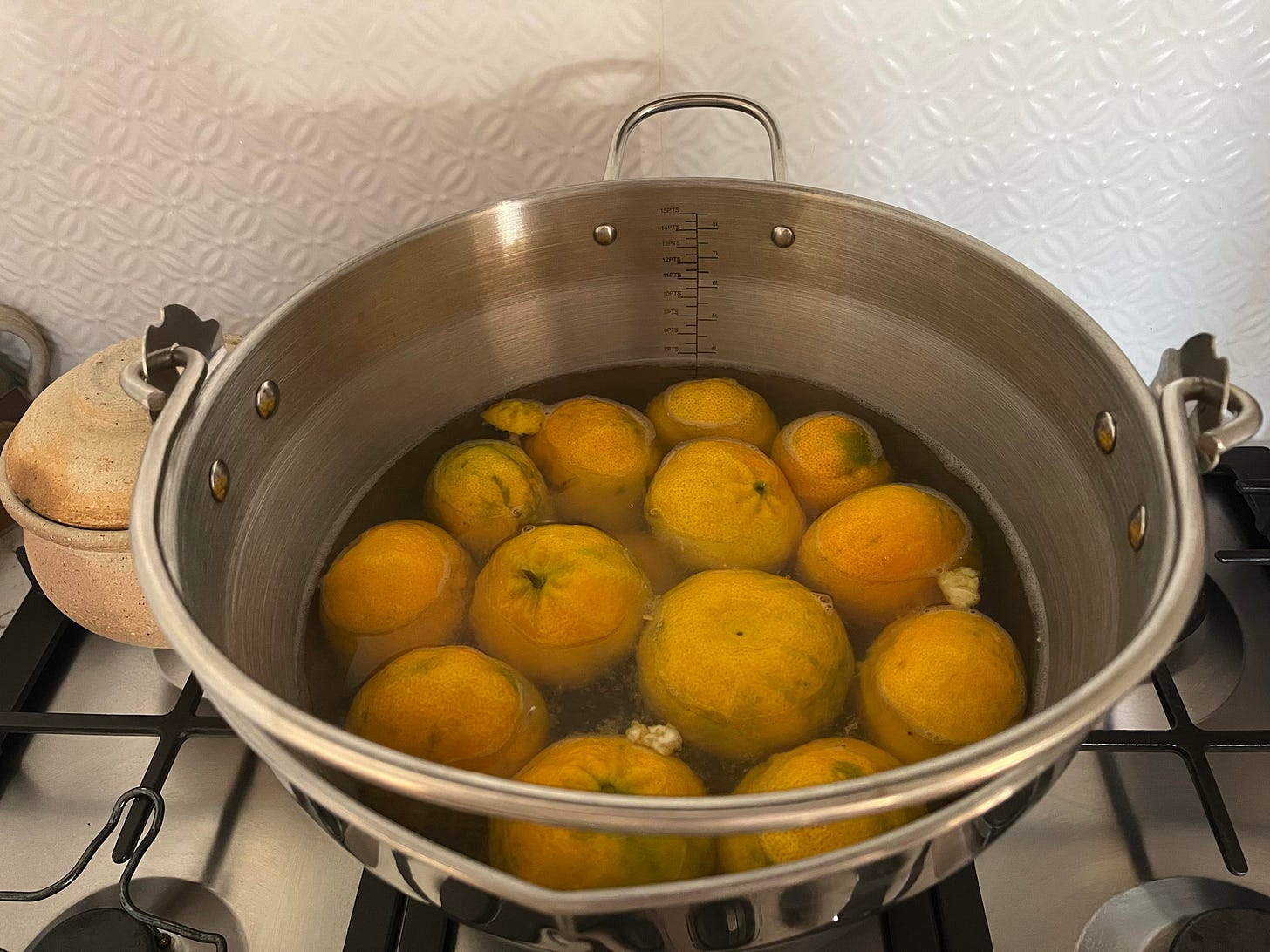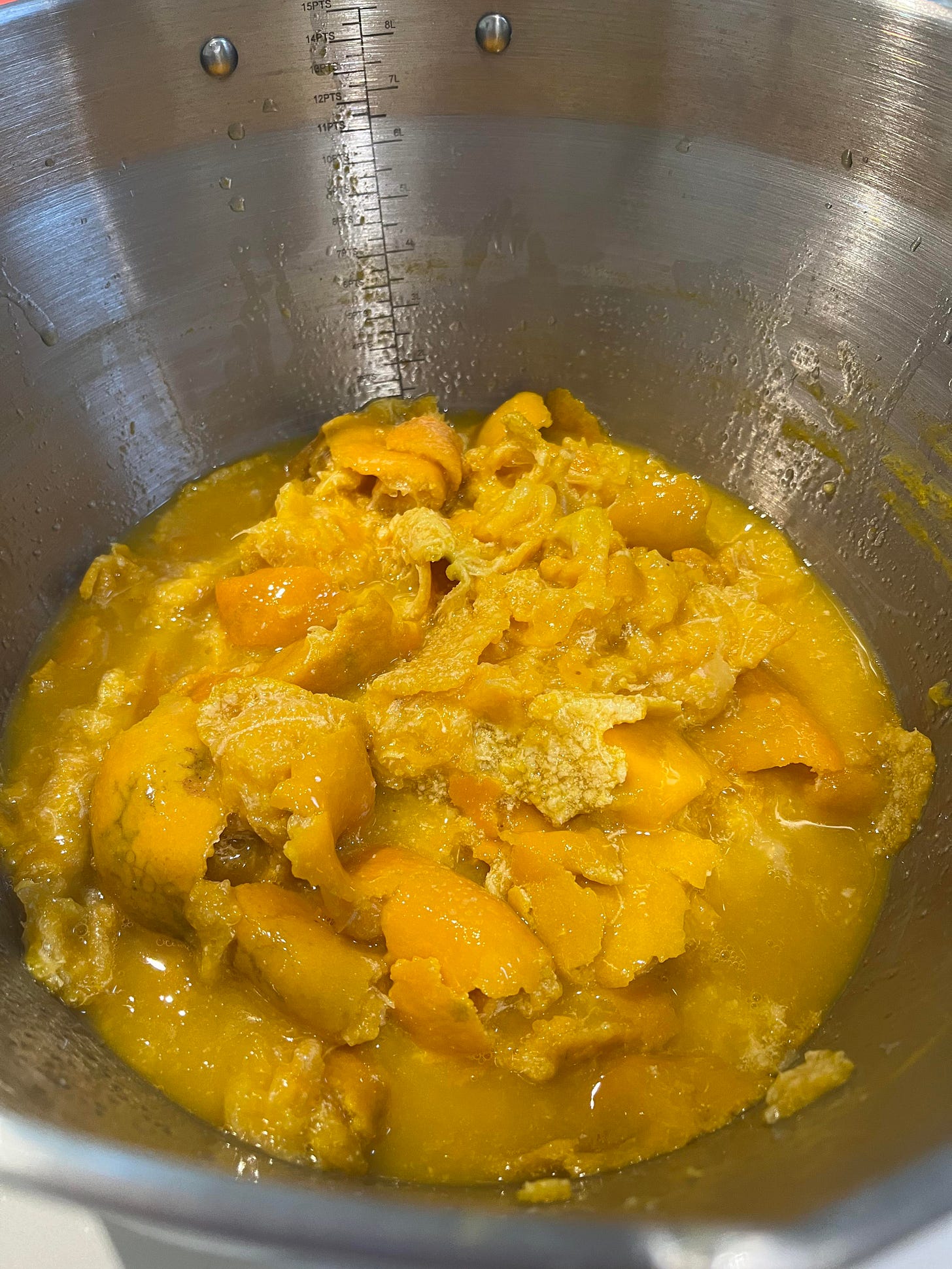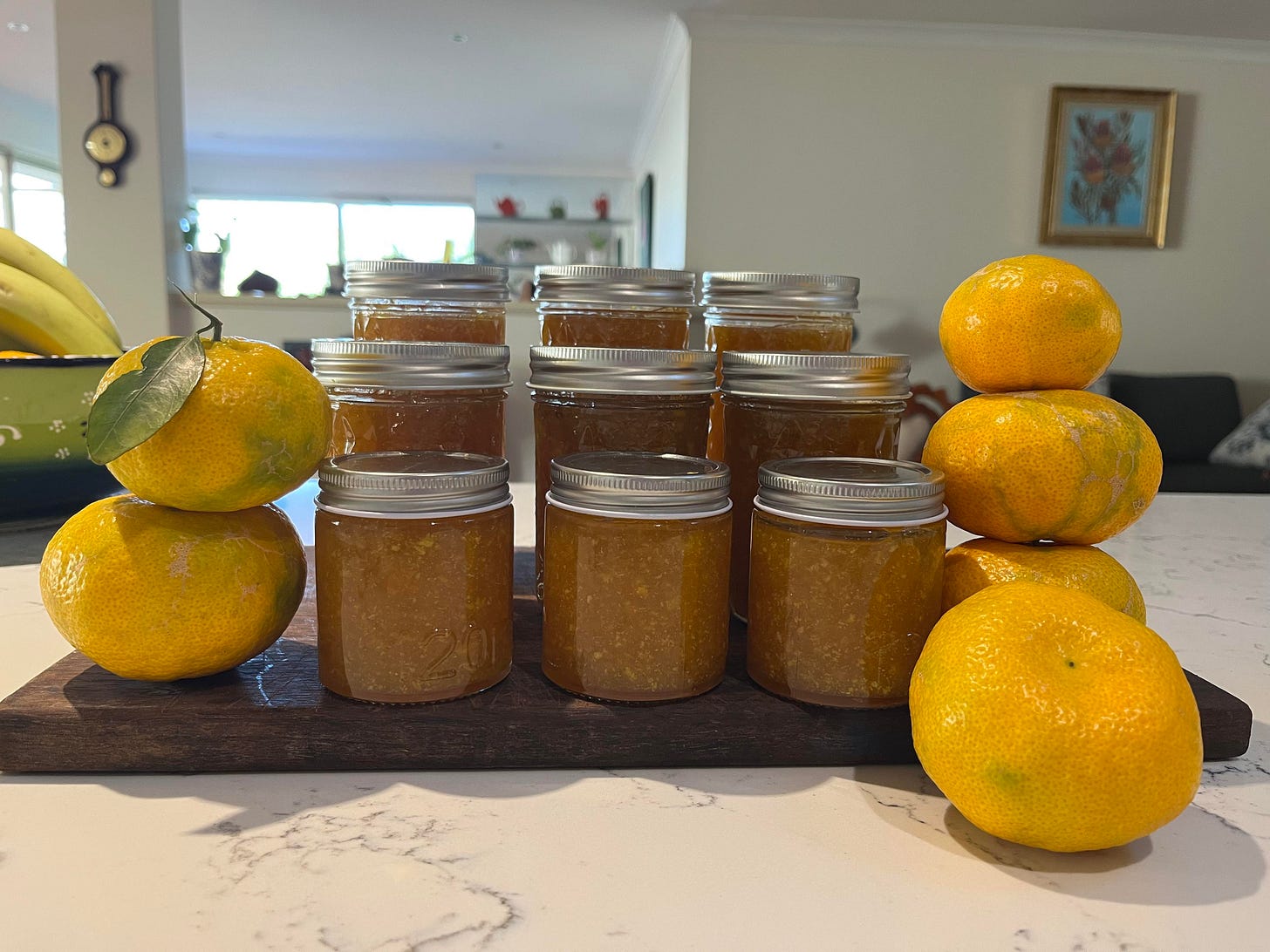When you want to create, but there's too much fruit ...
Musings about mandarins, marmalade and feeling groovy

Dear Creative Soul,
My house today has a cheerful, zesty and bright perfume, with mandarin-orange top notes, heart notes of cinnamon, ginger and neroli, and base notes of vanilla and Red Gum honey.
Outside the sky is a wintery blue with small cotton puffs of cloud randomly dotting the sky, as if a free-spirited artist has plonked their brush here and there just because they can. Inside, the house is beginning to cool, as winter finally begins to take hold; soon, the heater will go on, and the slippers. The cat, fed and content, has curled up on my lap, head tucked under her paw, belly rising up and down as she breathes in, out.
I have just finished bottling mandarin marmalade, nine jars in total. Our mandarin tree has again blessed us with an abundant crop; I have been picking fruit for weeks and the tree is still heavy with fruit that gets juicier and sweeter by the day. Each week, I give away bagfuls of fruit; each week, another couple of dozen fruit ripens.
A tangent
I want to live a slow and gentle life, but today I feel the teary edge of overwhelm creeping in. It is Sunday and we are talking about a few things we should do - the garden, pick and sort mandarins and lemons, visit the in-laws, ring the son who lives a seven-hour drive away, cook risotto because it’s on the menu - and what would be nice to do - a drive and a walk in bushland an hour south, make cookies, enjoying unscripted free time. What I want to do is not have to do anything because tomorrow I have a long day at work. In the end, the in laws are busy, beautifully life-giving rain comes in, and I have the whole day to potter and be.
I want to live slowly and gently, to gentle myself into the next stage of life, but I also want to paint flowers and sew tote bags and bake cookies and grow veggies from seed and make jam and write and do a puzzle and watch Stanley Tucci’s Italy and have long meandering conversations and walk on the beach and take photos of wildflowers and learn about permaculture and travel to new places … I have a choice to make. Three days a week was my sweet spot. Four is tipping it over the edge.
And back to the marmalade
To make the marmalade you need twelve mandarins, sugar (plus jam setting sugar), the juice of a lemon, sterilised jars and time. From this morning’s harvest, I choose ripe Imperial mandarins, plump and full in my hand, and place them in my preserving pan, adding the juice of a lemon (another tree bursting with fruit), and barely covering them with water.
Perhaps you don’t recognise the Imperial mandarins - until this week, I had not realised they were an Australian heirloom variety raised in the 1890s at Emu Plains, NSW, less than 10km from where I grew up. They are the first to ripen each year, the first you find in the stores from about April; they have a thin, easy-to-peel skin that releases a tangy, zesty mist into the air as the peel is pulled away from the pith. This bright, sunshiny scent evokes memories of childhood. Simpler times.
My maternal Opa grew Imperial mandarins in his Sydney back yard. A German toolmaker who came with his wife to Australia via the Assisted Passage Migration Scheme, he was not given to small talk but had plenty of opinions and a fondness for order. I don’t know what he thought of those mandarins, or why he chose that variety to grow, but I remember several trees planted in neat lines, each one trimmed and tamed by his meticulous hand. I imagine he would shake his head at my wild, three-metre tall tree and the equally wild native garden around it, but I am sure he would be impressed by the fruit. Even now, the Imperial mandarin variety is my favourite, and when I first break apart the skin of a fresh fruit, I think of my taciturn Opa and his neat, practical back yard.
Simmer the mandarins for about 90 minutes or until they are soft and breaking apart. Leave them to cool completely in the pot.
Mandarins have been traced back to China more than 3000 years ago; apparently the name references the bright orange robes of the mandarins, officials of the ancient Chinese court. Today, mandarins are considered a symbol of abundance and good fortune, and during the Chinese New Year are given as gifts to friends and relatives.
Before I grew my own mandarins, the only variety I would buy was the Imperial. To my tastebuds, no other variety measures up, and my sons feel the same. When they were young, as soon as mandarins were in season I would buy a bagful, but they never matched sun-warmed fruit picked straight from the tree or handed to me by Opa.
When the mandarins are cool, remove them from the pot, reserving the juice. Break open each mandarin and discard the seeds. Using a stick blender or food processor, puree the reserved juice and mandarins - skin and all. Place a small saucer in the freezer, in readiness for testing the set.
Last weekend, my husband and I picked several baskets of citrus fruit: mandarins, oranges, lemons. Before we sorted them into piles for friends, family, neighbours and colleagues, we stood in the warm winter sun and shared a mandarin (or two), reverting momentarily to our childlike selves with an impromptu seed-spitting competition. I have never been good at this game. Afterwards, our hands smelled of limonene and the cat wouldn’t come near us until we washed them.
Weigh the pureed fruit mixture, then measure out the same amount of sugar (I use half castor sugar and half CSR jam sugar). Warm the puree in the jam pan before adding the sugar, stirring until the sugar is dissolved. Bring the marmalade to a rolling boil; cook for about 20 minutes, removing the scum that forms on the surface.
I first tried to grow mandarins back in the 2000s. The tree took a few years to settle and bear fruit. I moved house before I successfully harvested any. We used to have a pool at the house we now own, a big rectangular water-sucker surrounded by dull paving. We sold the pool to a brickie who built sound-muffling limestone walls in front of our existing dividing fences; he wanted a pool and we wanted a garden. We collectively held our breath as a crane lifted that pool over our house; later, we conscripted our four kids into a “fill the hole” working bee that lasted a weekend. Our neighbours thought we were mean to take the pool away from the kids, but the truth is, they preferred the beach, and we preferred gardening to cleaning a pool.
Place the pot back on the stove and warm the fruit/water mixture before adding the sugar. Stir all the time to dissolve the sugar. Bring up to a rolling boil and cook for 20 minutes, then do the 'setting test'. Make sure you remove the scum that forms on the surface while the marmalade is cooking.
Our lemon tree has always been a heavy fruiter, but it took more than five years for the mandarin and orange trees to bear fruit. But now, after 15 years in this house, I can barely remember a time when winter wasn’t about picking fruit on weekends and divvying it up for cooking and sharing.
While the marmalade is cooking, wash your jars and lids in hot, soapy water then rinse; sterilise them by placing them in an oven preheated to 160-180ºC for about 15 mins.
Fruit abundance consumes my mind (and it doesn’t escape me that my abundance is a gift, while others - in warzones, humanitarian camps, or living rough - have less than nothing). For weeks, sometimes months, my weekend cooking is determined by fruit I’ve harvested. Will I make limoncello this weekend? A mandarin almond cake? How about the orange lightning cake? Or lemon yoghurt cake? Lemon curd anyone? Fancy a mulled wine? The Circle of Giving springs to life and I exchange mandarins for pumpkins, jam for a bag of figs, lemons for rhubarb. On Mondays, I leave fruit in the staff room at the start of the day; by lunch, the bowl is empty.
To test if the marmalade is set, spoon a small amount onto the cold saucer you placed in the freezer. Run your finger through it - if the marmalade stays separated, it's ready.
Growing up, I never liked marmalade - especially store-bought ones, which I found bitter. I don’t remember my mother ever buying it - she tended towards cherry and plum jams, probably because her parents did, and thus, do did I. After learning to make my own, I have come to appreciate the bitter-sweet flavour. One of the most delicious chocolate cakes I’ve made had orange marmalade in it. Last year’s batch of orange marmalade didn’t set properly and, not wanting to waste it, I searched for a way to use it. I made that cake every weekend for a month; I made more marmalade just so I could make more cake.
Carefully ladle the hot marmalade into hot jars and seal. Cool, then label the jars and share the goodness with loved ones. Or make the chocolate cake.
Slow down, you move too fast
I want to live a slow and gentle life and it bothers me that when there is too much fruit, and not enough time to create and my daughter wants to visit now, not tonight like we planned, I feel the tiniest guiltiest twinge of dismay. I don’t want to feel that, not ever, but at the same time, I can’t always be doing and pleasing and entertaining and fixing.
I want to live slowly and gently and not feel bad about it. Not feel guilty if I can’t save all the fruit, if I can’t cook tonight, if what I actually need is to see if the orchids in the nearby bushland have started blooming and to watch Bridget Jones’ Diary for the fifth time. To make a bookmark for a new Substack friend. To finish reading
’s book, The Notebook. To taste the marmalade, let it linger on my tongue before giving it all away.I want to live a slow and gentle life, and so I am easing into this slowly and gently, one day, one weekend, one month at a time. And when life gives me lemons, mandarins, oranges all at once, and there is no time for any of my other projects … I take a deep breath and hum this Simon and Garfunkel song.
Sunday afternoon. A cup of tea. Thick sourdough toast, creamy salted butter, spoonfuls of sunshine.
La Muse: Pausing to Wonder is a gift of words and will continue to be free for all readers for the foreseeable future. However, if you feel led (and able) to support my writing financially, there are a couple of options: 1) Buy Me a Coffee, which is a one-time “tip” as a way to say thank you, or 2) subscribe at one of my paid tiers if you wish to provide ongoing support. You can also recommend my Substack to other readers.
Either way, I am grateful that you have chosen to be here today, to be part of my community of readers and writers pausing to wonder (and wander). Let's keep connecting as a community and building each other up.








I'm eagerly awaiting our tree of lemons to ripen. Then I'll be busy making lemon curd, lemon yoghurt cake, lemonade (SO GOOD!), and lemon tarts. I used to think winter fruit was boring, but my tastes and attitudes are changing.
Thanks for the delicious descriptions in this piece - so yum!
Delicious, Monique 🥰 your words and the jam, of course! Happy Sunday and a great start to the new week 🖤